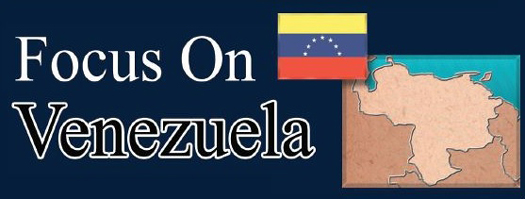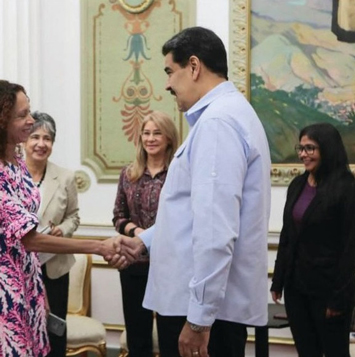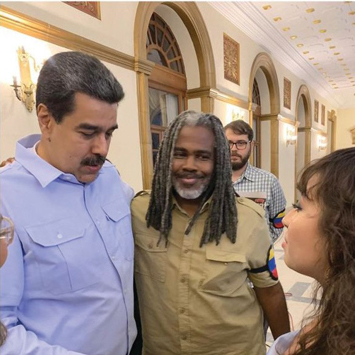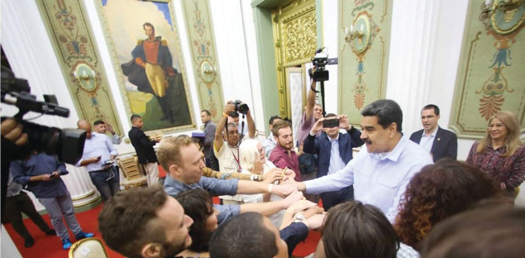Despite more U.S.-imposed sanctions, Maduro and Venezuelans ‘resolute,’ says activist
By Askia Muhammad -Senior Editor- | Last updated: Aug 28, 2019 - 10:39:51 AMWhat's your opinion on this article?

|
WASHINGTON—Even as more and more sanctions were announced by the Trump administration on top of strangling sanctions already in place against the Venezuela government of President Nicolás Maduro, the leader and his people remain resolute according to a friendly delegation which visited the embattled country.

Venezuela President Nicolás Maduro greets members of U.S. peace delegation.
|
“President Maduro is a resilient person,” Netfa Freeman, an activist with the Black Alliance for Peace, whose nine member delegation met the embattled leader and toured the country in early August, said in an interview after returning from Caracas.
“He’s an astute person,” and Venezuelans “are resilient,” Mr. Freeman continued. “It’s not just him, but it’s reflected in the people. It’s like, ‘We’re gonna overcome this challenge. We will not surrender. We want peace, but we will not surrender and we will prepare for war.’ And that was their attitude.”
U.S. President Donald Trump’s latest executive order imposes a full embargo on Mr. Maduro’s government, similar to U.S. sanctions against Cuba, Iran, North Korea and Syria. The latest sanctions were announced Aug. 5. The measure freezes all property and assets of the government and its officials and prohibits transactions with Venezuelan entities including its central bank and the state oil company, CITGO.
Venezuela possesses huge oil reserves, but remains locked in a political stalemate with the U.S. backed opposition, and has suffered from years of hyperinflation, shortages of food, water and medicine, and even power outages, some believe to be the result of U.S. inspired sabotage. Venezuelan officials denounced the U.S. actions as “economic terrorism.”
“They have said that this U.S. executive order is only against Maduro,” Vice President Delcy Rodriguez said in a televised address in Venezuela on Aug. 6. “No. This order attacks the entire population of Venezuela, all its sectors.”
Mr. Freeman and Vanessa Beck represented the Black Alliance for Peace in the Embassy Protection Collective delegation which traveled throughout the country for 10 days, meeting with community leaders, social organizations, and government officials.
For 37 days this spring until they were arrested by the U.S. Secret Service and removed, members of the Embassy Protection Collective heroically refused to hand over control of the Venezuelan embassy—officially the sovereign property of the legitimate government—to representatives of the U.S.-appointed “interim president” Juan Guaidó.

Nefta Freeman of Black Alliance for Peace and Nicolás Maduro
|
The arrested embassy protectors are now facing trials on the vague, “trumped up” charges of “interfering with certain protective functions,” of the U.S. government. That is a misdemeanor charge with a maximum sentence of one-year in jail and a $100,000 fine.
“Not only did we see and hear what they actually said to us, but it was also evident in the projects that they have on the ground, which are trying to mitigate the effects of sanctions and that kind of stuff,” Mr. Freeman continued. “People’s projects: opening healthcare clinics and schools and, residential areas. They’ve built over 500,000 homes for poor people. And when I say that, ‘they built,’ I’m talking about the people (doing the actual) building themselves.”
“We actually were able to see them laying the cement and doing all kinds of things. They have a bakery, they have healthcare clinics, childcare centers, all that, as well as a number of living habitats, in these, summit dwellings,” which the delegation saw.
“We’re really looking at something that’s a global phenomenon,” Mr. Freeman said of the people’s resistance to the U.S. meddling in their internal affairs. “The United States is on this rogue thing. The biggest threat to peace on the planet at this point (is) the United States government.
“But we will survive because the people see no alternative but to fight. They can look and see what’s happening in Haiti and Honduras and these types of, outcomes of imperialism and intervention. And they don’t want that for themselves.
“They know that the sanctions and the effects of the sanctions are nothing compared to what they will experience if in fact they surrender and capitulate. It’s just a question of the dignity of their people. It’s a movement that they’ve built and they feel like it’s theirs, and then (it’s) about self-determination, and so (they) will survive.
“So it’s not just about overthrowing a president and an army,” Mr. Freeman continued, “it’s about, they’re going to have to overthrow a people.” The U.S. cannot succeed in its attempts to overthrow the Venezuelan government without “killing a lot of people,” Mr. Freeman said.

Members of U.S. peace delegation greet Mr. Maduro.
|
“If we use a little common sense, we will know that if you are in Venezuela, would you want to collaborate with a country that just decimated Libya or is bombing Yemen, sending, drones (on) Somalia or Syria and those kinds of destabilization messages.”
An aggressive campaign last spring to overthrow the Maduro government failed. It included a failed, attempted uprising which produced only a handful of military defections in what the U.S. had hoped would be an all-out rebellion. “Guaidó has no support,” said Mr. Freeman.
“When we were there, no one was, talking about him, they were talking about Trump and they were also reiterating over and over how Maduro was a democratically elected president.” And so there’s nothing to the idea of growing support in the country for Mr. Guaidó. “While they might have concerns about their own government, like everyone has, there’s no such thing as a perfect government.
“They know that’s their government and they know that whatever those concerns are, it’s up to them to be able to handle that and no one else.” The United States should not “have the right to tell them what to do about it.”
INSIDE STORIES AND REVIEWS
-
-
About Harriett ... and the Negro Hollywood Road Show
By Rabiah Muhammad, Guest Columnist » Full Story -
Skepticism greets Jay-Z, NFL talk of inspiring change
By Bryan 18X Crawford and Richard B. Muhammad The Final Call Newspaper @TheFinalCall » Full Story -
The painful problem of Black girls and suicide
By Charlene Muhammad -National Correspondent- » Full Story -
Exploitation of Innocence - Report: Perceptions, policies hurting Black girls
By Charlene Muhammad -National Correspondent- » Full Story -
Big Ballin: Big ideas fuel a father’s Big Baller Brand and brash business sense
By Bryan Crawford -Contributing Writer- » Full Story






 Click Here Stay Connected!
Click Here Stay Connected!








